#General Pompey
Explore tagged Tumblr posts
Text
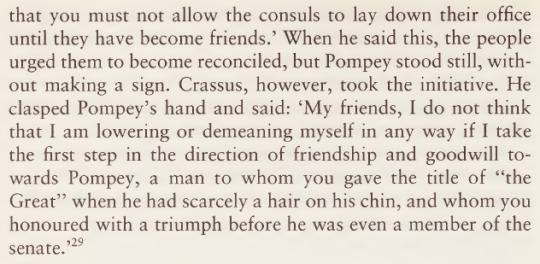
literally if I was pompey I'd like. I'd have to leave and never return to rome OR I'd have to kill him immediately
#id be MORTIFIED#there's no way to save face after that#alternatively i would simply have to marry him but its like (checks notes) give it a few generations#you'll get there#like. caesar kept faith with crassus but pompey. i cant finish that sentence actually
41 notes
·
View notes
Note
Please, what is on your Crassus playlist?
my crassus playlist is actually a crassus-sulla (maybe pompey, one of these reminds me of caesar) playlist! here it is :)
#vuja de is crassus-sulla-pompey btw#soul for sale is caesar but applicable to whomever depending on my mood#that song prompted some absolutely wild overly ambitious ideas i'm working on lmao#there's a couple of songs that aren't on that playlist like fucking. sb19's gento because it's exactly one lyric that gets my brain turning#renaissance (paulo buonvino & skin) is on my general trikaranos playlist#bc that's a villain song for me#ask tag#rec tag
21 notes
·
View notes
Text
RIP Archilochus you would have hated Pompey's finely coifed hair. ω Ζευ or eheu or whatever!
#a general exalting in his locks or what have you#Archilochus 114#Archilochus#Pompey#ancient greece#ancient rome#roman senators#classics#I can't put ancient accents or breathing marks with this greek keyboard :(#eheu!!!
5 notes
·
View notes
Text

Genuinely have had enough of this man (affectionate)
Life of Pompey, Plutarch
#rereading life of pompey#he s so relatable idc#pompey magnus#the general here is his dad Strabo to be clear
3 notes
·
View notes
Text
ISO
I ALMOST did it. I almost took the lazy modern way and just downloaded an AI art app and told it what I wanted. But I won't do it. Making a difference and saving art means not being lazy or cheap.
So with that said I know theres a lot of art blogs I follow and who follow me and all that good stuff so if anyone thinks they would be up for the challenge of illustrating some historical figures for me I'd be very happy to see some examples of your art style and if it's what I'm looking for and come to an agreement on commissions and stuff.
Namely I need Pompeius Magnus in the style of a Lee Pace looking dude... So give me Lee Pace with gingery curls in a toga or Roman general's uniform basically
#iso art#art#anti ai#no ai art#support the artist#Pompeius Magnus#Pompey the great#Pompey#art iso#illustrations#roman art#ancient rome#how often do you think about the roman empire#the Roman empire is my Roman empire#lee pace#toga#roman generals#alexander the great
6 notes
·
View notes
Text
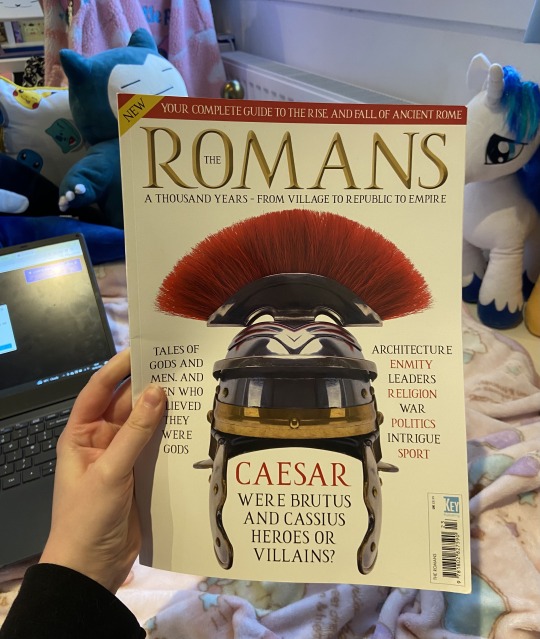
my friend bought me this i’m going to cry
#i had the worst breakdown of my life a few days ago and they wanted to get me a post breakdown gift shjkshshskk#cries and pisses. when people buy me roman stuff. or special interest stuff in general….#like you listen to me when i talk. you care about what i like#the fact that it’s a late republic one too and it’s mostly abt caesar and pompey YOU KNEW THEYRE MY FAVOURITES????
9 notes
·
View notes
Text


yey 👍
#spam tag#sextus pompey#sorry i know i’m not reading the general vibes rn but DREAMING OF MERCY / SWEAR THEY MOVED THAT SIGN#i’m not welllll
1 note
·
View note
Text

Mon éducation (The Exemplary Death of Marcus Licinius Crassus), Aurélien Gamboni. "The installation stages the "exemplary" death of Roman general Crassus during his military campaign in Mesopotamia. According to the myth, the Parthians poured molten gold down his throat to punish him for his greed, a legend which is translated here as a peculiar sculpture: a golden digestive system, operating both as an improbable historical artefact and as a sarcastic commentary about art fetishism. In the background of this vanity stands a series of grotesque chewing-gum drawings on wood, giving threats, insults, warnings and bad omens, in the style of a Roman theater chorus.
Marcus Licinius Crassus stands in history as one of the most despised public figures of his time. Owner of a considerable wealth amassed in dubious conditions, and victor of the slave revolt led by Spartacus in 71 B.C., he later took part – with Caesar and Pompey – in the first triumvirat which precipitated the end of the Roman Republic."
http://ag-archives.net/en/projets_ab_crassus
3K notes
·
View notes
Text
'I am no king, but Caesar'

Gaius Julius Caesar was born on July 12, 100 BC in the Suburra, a populous neighborhood of Rome, to a patrician family although in economic decline. In Gens Iulia, those who had the surname Caesar descended, according to the account of Pliny the Elder, from a man who was born after a Caesarean section (from the Latin verb "to cut", caedo, -ĕre, caesus sum). He was born in a Republic in crisis and the aristocracy divided into two warring factions: The optimates and populares. He lost his father when he was about 14 years old; he was greatly influenced by his maternal uncle Gaius Marius. Caesar had an older sister, Julia Major, and a younger sister Julia Minor (maternal grandmother of Emperor Augustus). His uncle, Gaius Marius, was the leader of the Populares ("supporters of the people") and rival of Lucius Cornelius Sulla, leader of the Optimates ( "best ones")

In 84 BC Lucius Cornelius Cinna, an ally of Gaius Marius, chose the 16 year old Caesar to be flamen Dialis (priest of Jupiter) and married him to his 13 year old daughter Cornelia with whom Caesar had a daughter named Julia. It is not certain whether the girl was born a few months before or after the teen Caesar had fled Rome or, more likely according to historians, she was born when he returned years later and was reunited with his wife.
Following the suicide of Gaius Marius in 86 BC, Cinna, one of the leaders of the Populares, became sole ruler of Rome and most of the provinces while persecuting Sulla's followers. In 84 Cinna was assassinated and populares defeated.
Due of his ties to the Cinna family, Sulla attempted to force Caesar to divorce Cornelia if he wanted to live in peace, but Caesar refused. Sulla confiscated his property, and he was forced to leave Rome. Populares supporters and Caesar's own mother pressured Sulla to allow him to return, claiming that he was not dangerous as he was just an adolescent. Sulla refused and said "I see several Marius in him" referring to his archrival Gaius Marius, Caesar's uncle.
Shortly afterwards, although he was allowed to return to Rome, Caesar decided to head to Asia to participate in the war against Mithridates VI of Pontus. There he distinguished himself in the capture of Mytilene. He then headed to Bithynia, a kingdom allied to Rome, where he spent some time.

In addition to being a politician and a soldier, Julius Caesar was a writer. Among others, his works were a treatise on astronomy, another on Roman religion, a study on Latin and his comments on the war in Gaul and the Civil War; only his writings on those two wars have not been lost.
In the year 78 after Sulla's death from natural causes, Caesar decided finally to return to Rome. He was reunited with his wife Cornelia, who had waited patiently for him. Nine years later, Cornelia- the only woman he truly loved, according to all accounts- died at the age of 28. Caesar went into deep mourning and gave a solemn speech.

After serving as quaestor in the Hispania Ulterior province where he increased his network of clients - patronage was key to success in Roman politics - Caesar returned to Rome in 69 BC where he served as Aedile; he carried out building programs and offered the largest gladiatorial games seen until then. This left him almost bankrupt. In 60 BC he decided to make a private agreement with the prestigious general Pompey the Great and one of the richest man, Marcus Licinius Crassus. Pompey had just put an end to the pirate problem and years earlier, together with Crassus, he had defeated the slave rebellion led by Spartacus.
Pompey and Crassus were hampered in many of their ambitions by the Optimates in the Senate. Caesar, knowing this, approached them to put together an unofficial coalition - known to history as the Triumvirate - if they made him Consul, he would see to it that laws were passed that would benefit them. To further consolidate this alliance, in the year 59 BC Caesar married Pompey to Julia. Although this was a typical political marriage, classical sources state that Julia truly loved Pompey and he loved her.
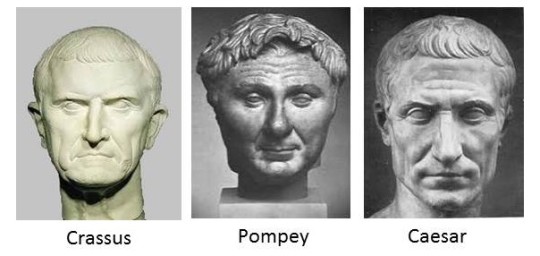
Pompey and Crassus decided to ally themselves with Caesar and the populares in order to gain more offices and wealth. In this way, the three took full control of Rome. In 59 Caesar was appointed consul.
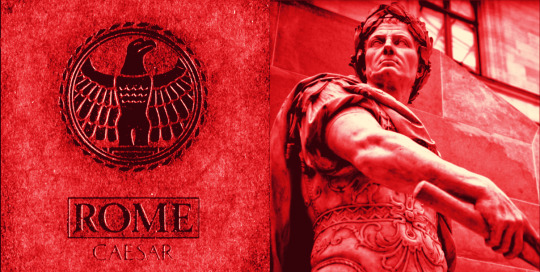
Laws were passed granting the province of Syria to Crassus. Laws were passed distributing lands among Pompey's veterans. And at his own request, the Gallic provinces-both the pacified and the "wild" ones- were handed over to Caesar. Cicero, a true defender of the Republic, was exiled due his bold speeches against the Triumvirate, which he called a "three-headed monster" but was allowed to return the following year. The passage of the laws favoring the triumvirs was ensured by introducing veteran legionaries of Pompey into the meetings of the Senate.
Also in 59 BC Caesar established a military camp in the Arno valley, on the Via Cassi, the main communication route between Rome and the north of the country. He called the camp Florentia, which means "flowering." The camp quickly became an important commercial town. Today it is the beautiful Italian city Florence.

In Gaul with his legions, he defeated and subdued several peoples in just a few years. Caesar wrote in detail about this conquest in his Bellum Gallicum (Gallic War). Believing that everything was under control, he headed to the mysterious land that the Romans called Britannia and where they believed the world ended. The Gallic War was between 58-52 BC

Caesar finally arrived in Britain for the first time in the summer of 55 landing with two legions. The following year he arrived with 800 ships, five legions and 2,000 cavalry. Caesar's comments on this war constitute the first written descriptions of the people, culture and geography of the island.

Although Caesar not conquered Britania (it was conquered under the Emperor Claudius) this campaign it established Rome's first allied peoples in Britain.
While in Britania, Caesar received the news that his daughter and the baby she was expecting had died in childbirth.
At the same time he had no idea that a genuine leader named Vercingetorix, of the Arverni tribe, had managed to unite all the Gallic peoples under his authority, determined to expel the Romans

Caesar himself called him "King of all the Gauls"
The most famous and final battle was that of Alesia. Although Vercingetorix was a great warrior, he could do nothing against the genius (sometimes bordering on madness) of Caesar and his legionaries. According to Caesar, Vercingetorix, seeing that if he continued he would starve his entire people to death due to the siege, rode towards the Roman camp, dismounted, took off his sword and sat on the ground without saying a word. He decided to surrender in exchange for his people living. And so it happened, Vercingetorix was taken prisoner but his men were not executed. But Caesar had to wait years for his triumph -and Vercingetorix had to wait as a prisoner in Rome, before his execution- because while Caesar was fighting against the Gauls, many Roman senators were plotting his downfall.

Everything Caesar wrote about his battles and conquests, written in the third person, was copied and sent to be read publicly in Rome, which was celebrated by the plebs and Caesar 's supporters. True republicans such as Cato, Cicero, Cassius, and Brutus perceived a real danger to the Republic. The Triumvir Crassus was killed by Parthians in his failed attempt to conquer Parthia: The triumvirate was over and Pompey, who had become Sole Consul saw in Caesar a dangerous rival, and allied himself with the Optimates again.
They created a new law: the office of consul or proconsul could no longer be held in absentia, as well as running for those offices outside of Rome. Thus, Caesar, far from Rome, lost the protection of the law that granted him his magistracy—just as today, the President of a nation cannot be prosecuted while in office—and could no longer run for election as consul or proconsul. Clearly, the idea was to put him on trial and send him, hopefully, into exile, since thanks to this law, he instantly became an ordinary citizen.
Upon receiving this news, Caesar was enraged and decided to return to Rome not as a citizen, but as a general commanding his legionaries, who followed him devotedly. He would later say, "I never wanted this war, but my adversaries have eagerly sought it."
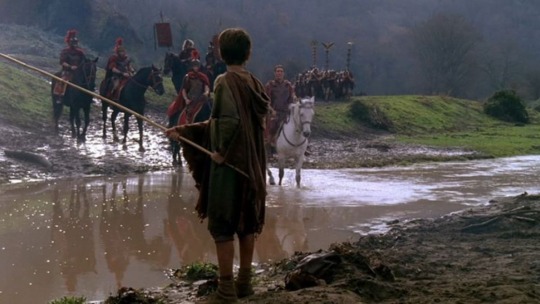
No legion was to reach Rome by crossing the Rubicon River; such an action meant civil war.. Caesar crossed the Rubicon with his XIII legion and proclaimed a very popular phrase in Ancient Rome that players always said before throwing the dice: "Alea Iacta Est" (the die is cast). This is known thanks to Roman historians who took as a source the writings of Gaius Asinius Pollio, who was close to Caesar and could have heard him. This saying became legendary even for the ancient Romans due to the surprising idea of using this phrase from a game in the context of a war.
Pompey and his legionaries left Rome and prepared for the war in Greece. In September of 48 Pompey was defeated at the Battle of Pharsalus. But he did not give up and headed to Egypt to seek the support of the young king Ptolemy XIII. Egypt was then a vassal kingdom of Rome due to its years of indebtedness, and the creditor was precisely Pompey, who had lent huge sums to Ptolemy XII. But as soon as he landed in Egypt, he was met by a group of men who, in the name of the young king, beheaded him and took his ring.
Fun fact: Among those who fought alongside Pompey against Caesar was the centurion Titus Flavius Petro, who after the defeat at Pharsalus was pardoned by Caesar and returned home; he was the grandfather of Titus Flavius Vespasian, the emperor who replaced the Julio-Claudian dynasty with his own Flavian dynasty in 69 AD.
While Cato the Younger and his men went to the province of Africa to continue the resistance, and Pompey's sons did the same in Hispania. Caesar went looking for Pompey to try to come to an agreement.
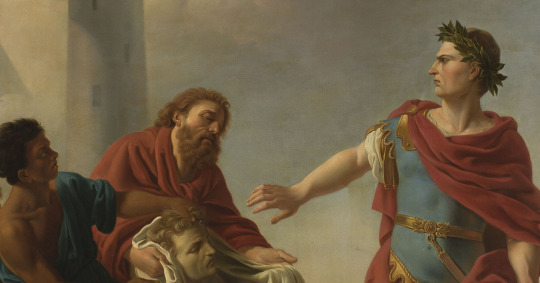
'Julius Caesar’s Dismay Upon Seeing The Head Of Pompey' (detail) By Louis-Jean-François Lagrenée (18th century)
King Ptolemy XIII, who was engaged in his own war with his sister Cleopatra for the throne, thought that by killing Pompey and giving his head and ring as a gift he would earn Caesar's gratitude and thus his kingdom would settle the unpayable debt it owed Rome. But Caesar was enraged by the undignified manner in which a Roman general and consul had been murdered and decided to side with Cleopatra and her allies.
The meeting between Cleopatra VII and Caesar at night and she entered hidden inside a huge rolled-up carpet carried by his slaves. Cleopatra was one of the many lovers that he had, they lived together and had a son, nicknamed Caesarion (little Caesar) whom he recognized but not legally. While Republican forces continued to resist, Caesar was immersed in the war between Ptolemy XIII, Cleopatra and the other sister, Arsinoe IV. Caesar's troops, together with those of Cleopatra plus Caesar's allies such as Mithridates of Pergamon and his army and a Jewish armed force led by Antipater finally won that war in January 47 and Cleopatra kept the throne of Egypt.
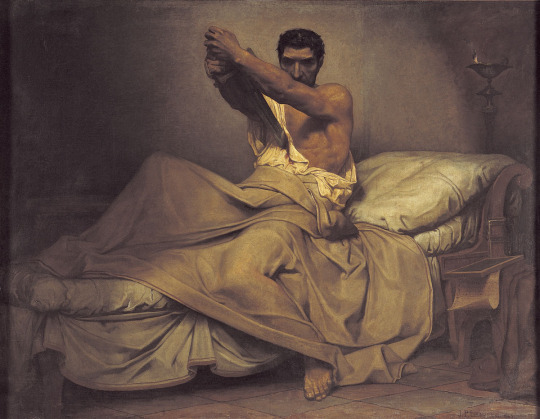
The Death of Cato of Utica, By Jean-Paul Laurens.
In early 46 BC, Caesar defeated the army of Cato the Younger, also known as Cato of Utica . Cato did not take part in the battle and being in Utica, Africa, after receiving the news that Caesar had won and pardoned his adversaries, decided to take his own life at the age of 49. Cato had a republican soul but was stubborn man, and was convinced that Caesar wanted to be king. He was the half-brother of Brutus's mother, Servilla (Caesar's long-time lover).
It was in this same year that Caesar, with the advice of the astronomer Sosigenes of Alexandria, reformed the calendar, leaving each month with the same number of days as it has today and creating the leap year.
The final battle of Munda, in Hispania, was on March 17, 45 BC, thus ending the civil war. Caesar returned to Rome and an intimidated Senate legitimized his victory by appointing him dictator for a ten-year term.
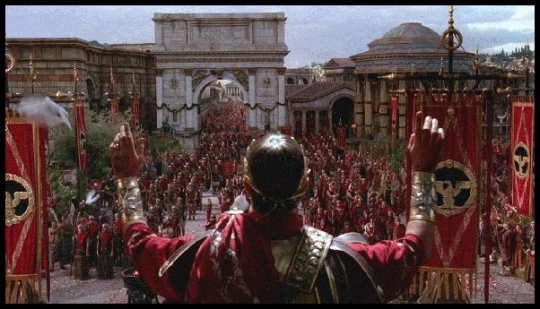
The position of Dictator was created by the Republic itself; he was a magistrate, elected by the Senate, with absolute powers to resolve military emergencies or exceptional tasks for a period of six months. He had to leave after that period or before if he managed to resolve the problem. This 10-year dictatorship was unprecedented.
In February 44 BC, Caesar succeeded in having the people of Rome proclaim him dictator for life. Cicero resigned from political life in protest.
Cassius persuaded Brutus that the only way to save the Republic was to kill Caesar. They needed Brutus to lead the conspiracy because of his prestige; he was not only Cato's nephew but also the direct descendant of the Republic's founding father.
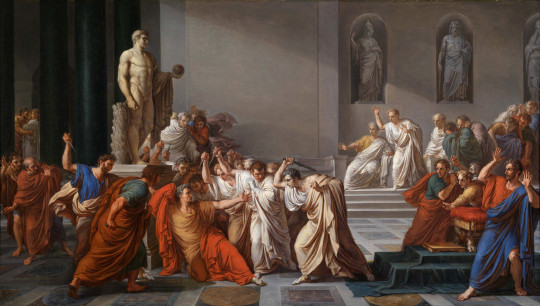
The Death of Caesar. By Vincenzo Camuccini (1805)
On 15 March 44 BC the group of conspirators intercepted Caesar just as he was passing the Theatre of Pompey, where the Roman Curia was meeting, and led him into a room off the portico. Lucius Tillius Cimber, under the pretext of presenting a petition, grabbed Caesar's toga with both hands and pulled him so tha Publius Servilius Casca could stab him, causing Caesar to exclaim "Ista quidem vis est?" ("What kind of violence is this?") Casca, drawing a dagger, slashed him across the neck. "What are you doing, Casca, you villain?" were perhaps his last words.
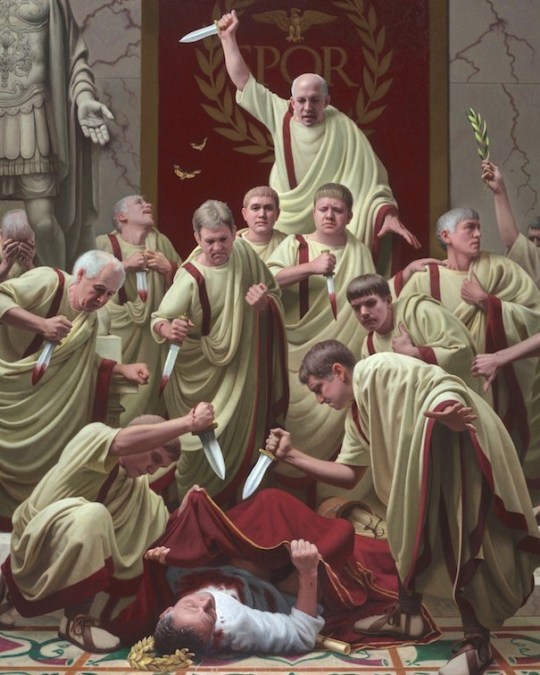
According to classical sources, he tried to flee but slipped on his own blood. A Roman coroner stated that "Caesar's body had several cuts, and 23 stab wounds but only one of them, in the chest, was fatal." They also claim that as he lay dying he took his toga and covered his face so that no one would see him die. He was 55 years old.

Mark Antony with other colleagues carefully collected the body and carried it before the people. Then he made a memorable speech.
The month then called Quintilis, the month of Caesar's birth, was renamed Iulius (July) in his honour on the initiative of Mark Antony. Julius Caesar was the last dictator of Rome; the office was abolished after his death.
Caesar named his grandnephew Gaius Octavius Thurinus as sole heir and adopted son, taking the name Gaius Julius Caesar Octavianus. As was customary in this type of adoption, he had the name of his maternal relative and since then he legally belonged to the family clan, in this case the Julii, adding to his new name the original paternal lineage: Octavianus ( "of the Octavii").
A good example to understand this is the father of Empress Livia, who was born with the name Appius Claudius Pulcher and who, upon being adopted by his maternal uncle Marcus Livius Drusus, changed his name to Marcus Livius Drusus Claudianus.
But nowhere in Caesar will did he say that his nephew should be his successor in office. It was very common among Roman aristocrats without sons to adopt a nephew, son of a sister or niece, or a grandson through a daughter if the father had already died, to continue the surname or clan name (nomen gentile).
If he legally recognized Caesarion, the boy would become a Roman citizen, and it would be a serious problem if the king of Egypt were Roman, as he could claim a throne in Rome. This shows that Caesar did not intend to establish a monarchy and was genuinely concerned about his fatherland.
Octavius certainly benefited from the adoption, but he became the Emperor of Rome thanks to his iron will, extraordinary cunning and political skill.
After his death, Caesar was proclaimed Divus Iulius, or the Divine Julius. He was the first Roman ruler to be deified.
After the end of the Julio-Claudian Dynasty, the cognomen CAESAR would become a Title of the Imperial Power, even many centuries later translated into other languages, such as the German Kaiser or the Russian Tsar.

In front of the theatre, an altar was erected where the pyre was placed so that Julius Caesar's body could be cremated in great mourning. Part of this altar is still preserved in the ruins; more than two thousand years after the assassination, every 15th of March, people come to leave flowers there.

Photo by Giovanni Dall'Orto, taken on March 15, 2008 Attribution, via Wikimedia Commons
192 notes
·
View notes
Text
Since my last post got so many notes (thank you!!), I thought I’d share more scenes from the performance. This is a collage of key moments from Julius Caesar, staged at the Curia of Pompey on March 15—exactly where and when it happened.
The video starts with Lucius, Brutus’ servant, announcing: “Oggi è il 15 marzo.” (Today is March 15.)
Then comes the assassination scene.
Next is Mark Antony, standing over Caesar’s body, delivering one of the most devastating monologues in Shakespeare:
“O pardon me, thou bleeding piece of earth,
That I am meek and gentle with these butchers.
Thou art the ruins of the noblest man
That ever livèd in the tide of times.
Woe to the hand that shed this costly blood!
Over thy wounds now do I prophesy
(Which like dumb mouths do open their ruby lips
To beg the voice and utterance of my tongue)
A curse shall light upon the limbs of men;
Domestic fury and fierce civil strife
Shall cumber all the parts of Italy;
Blood and destruction shall be so in use
And dreadful objects so familiar
That mothers shall but smile when they behold
Their infants quartered with the hands of war,
All pity choked with custom of fell deeds;
And Caesar’s spirit, ranging for revenge,
With Ate by his side come hot from hell,
Shall in these confines with a monarch’s voice
Cry “Havoc!” and let slip the dogs of war,
That this foul deed shall smell above the earth
With carrion men groaning for burial.”
And finally, the funeral oration—the moment Antony lights the fire of revolt in the Roman people:
“Hath told you Caesar was ambitious.
If it were so, it was a grievous fault,
And grievously hath Caesar answered it.
(…)
He was my friend, faithful and just to me,
But Brutus says he was ambitious,
And Brutus is an honorable man.
He hath brought many captives home to Rome,
Whose ransoms did the general coffers fill.
Did this in Caesar seem ambitious?
When that the poor have cried, Caesar hath wept;
Ambition should be made of sterner stuff.
Yet Brutus says he was ambitious,
And Brutus is an honorable man.
You all did see that on the Lupercal
I thrice presented him a kingly crown,
Which he did thrice refuse. Was this ambition?
Yet Brutus says he was ambitious,
And sure he is an honorable man.
I speak not to disprove what Brutus spoke,
But here I am to speak what I do know.
You all did love him once, not without cause.
What cause withholds you, then, to mourn for him?
O judgment, thou art fled to brutish beasts,
And men have lost their reason! Bear with me;
My heart is in the coffin there with Caesar,
And I must pause till it come back to me.”
(I love those last lines. The way grief physically overwhelms Antony, the way he can’t even finish speaking—it gets me every time.)
#julius caesar#shakespeare#ides of march#15th march#theater#rome#ancient rome#history#historical reenactment#live theatre#brutus#mark antony#william shakespeare
140 notes
·
View notes
Note
have you perhaps read the spartacus novel by h. fast?? it inspired the 1960 movie and crassus is...definitely interesting in it
I have! I've been interested in Spartacus for MUCH longer than I've cared about Crassus. I was actually a Crassus Hater™ for a decade, not because of anything he did in regards to Rome (like yeah, go ahead babygirl, extort those properties from your fellow romans, I love to see it) but because I wanted Spartacus to run Crassus through on his spear and read the fate of Rome in his entrails or whatever.
and I still do! but he lives, and reception on Crassus is fun to explore.
anyway, I have read it, yes!
#he's so weird. in general. like he's a roman but he's not quiteeee right as a roman so he lends himself to be coded in certain ways#in media if youre doing media that's got themes#like. idk. i was thinking about this a few weeks ago but pompey and crassus have a kind of antony-fulvia thing going on#in terms of house a political household is managed in rome except its less a specific house#but rome itself (a roman household: a tomb. rome: a mass grave) and crassus stays IN rome while pompey goes and conquers#so the. the division of responsibilities is like. (bites my own tongue) ANYWAY#what i was getting at is that crassus as a character is inclined to Interesting and Weird decision making#because the historical man was. Hm™#god there's a good starz spartacus essay on his character in that show that dives into past portrayals of him#i should post some of that here or smth#ask tag
28 notes
·
View notes
Photo

Roman Egypt
The rich lands of Egypt became the property of Rome after the death of Cleopatra VII in 30 BCE, which spelled the end of the Ptolemaic dynasty that had ruled Egypt since the death of Alexander the Great in 323 BCE. After the murder of Gaius Julius Caesar in 44 BCE, the Roman Republic was left in turmoil. Fearing for her life and throne, the young queen joined forces with the Roman commander Mark Antony, but their resounding defeat at the Battle of Actium in 31 BCE brought the adopted son and heir apparent of Caesar, Gaius Julius Octavius (Octavian), to the Egyptian shores. Desperate, Cleopatra chose suicide rather than face the humiliation of capture. According to one historian, she was simply on the wrong side of a power struggle.
Early Relations with Rome
Rome's presence in Egypt actually predated both Julius Caesar and Octavian. The Romans had been involved periodically in Egyptian politics since the days of Ptolemy VI in the 2nd century BCE. The history of Egypt, dating from the ousting of the Persians under Alexander through the reign of the Ptolemys and the arrival of Julius Caesar, saw a nation suffer through conquest, turmoil, and inner strife. The country had survived for decades under the umbrella of a Greek-speaking ruling family. Although a center of culture and intellect, Alexandria was still a Greek city surrounded by non-Greeks. The Ptolemys, with the exception of Cleopatra VII, never traveled outside the city, let alone learn the native tongue. For generations, they married within the family, brother married sister or uncle married niece.
Ptolemy VI served with his mother, Cleopatra I, until her unexpected death in 176 BCE. Despite having serious troubles with a brother who challenged his right to the throne, he began a chaotic rule of his own. During his reign, Egypt was invaded twice between 169 and 164 BCE by the Seleucid king Antiochus IV; the invading army even approached the outskirts of the capital city of Alexandria; however, with the assistance of Rome, Ptolemy VI regained token control. While the next few pharaohs made little if any impact on Egypt, in 88 BCE the young Ptolemy XI succeeded his exiled father, Ptolemy X. After awarding both Egypt and Cyprus to Rome, Ptolemy XI was placed on the throne by the Roman general Cornelius Sulla and ruled with his step-mother Cleopatra Berenice until he murdered her. Ptolemy XI's ill-advised relationship with Rome caused him to be despised by many Alexandrians, and he was therefore expelled in 58 BCE. However, he eventually regained the throne but was only able to remain there through kickbacks and his ties to Rome.
When the Roman commander Pompey was soundly defeated by Caesar in 48 BCE at the Battle of Pharsalus, he sought refuge in Egypt; however, to win the favor of Caesar, Ptolemy VIII killed and beheaded Pompey. When Caesar arrived, the young pharaoh presented him with Pompey's severed head. Caesar reportedly wept, not because he mourned Pompey's death but supposedly had missed the chance of killing the fallen commander himself. Also, according to some sources, in his eyes, it was a disgraceful way to die. Caesar remained in Egypt to procure the throne for Cleopatra as Ptolemy's actions had forced him to side with the queen against her brother. With the defeat of the young Ptolemy, the Ptolemaic kingdom became a Roman client state, but immune to any political interference from the Roman Senate. Visiting Romans were treated well, even 'pampered and entertained' with sightseeing tours down the Nile. Unfortunately, there was no saving one Roman who accidentally killed a cat - sacred by tradition to the Egyptians - he was executed by a mob of Alexandrians.
History and Shakespeare have recounted ad nauseam the sordid love affair between Caesar and Cleopatra; however, his unexpected assassination forced her to seek help in safeguarding her throne. She chose incorrectly; Antony was not the one. His arrogance had brought the ire of Rome. Antony believed Alexandria to be another Rome, even choosing to be buried there next to Cleopatra. Octavian rallied the citizens and Senate against Antony, and when he landed in Egypt, the young commander became the master of the entire Roman army. His victory over Antony and Cleopatra awarded Rome with the richest kingdom along the Mediterranean Sea. His future was guaranteed. The country's overflowing granaries were now the property of Rome; it became the 'breadbasket' of the empire, the 'jewel of the empire's crown.' However, according to one historian, Octavian believed that Egypt was now his own private kingdom, he was the heir of the Ptolemaic dynasty, a pharaoh. Senators were even prohibited from visiting Egypt without permission.
Continue reading...
56 notes
·
View notes
Note
hi! so - and i hope this isnt too weird of a question, im asking out of genuine curiosity - which books or like, media?, would i need to consume in order to get most of the lore fueling your (fanart?) drawings and ponderings? it all looks so interesting but i mostly dont have any idea who is who, or what are the dynamics, or whats happening but id like to learn, at least the basics.. okay, if you ever get to answering this thank you!! and have a lovely day! oh and your artstyle is seriously wonderful to look at even tho i dont know whats happening
Hi, Anon!
First of all, thank you so much for your kind words! If only you knew how much it warms my soul to think that someone might be interested in something just because of my drawings! That's one of the reasons I draw: I'm a very depressed person and it's very hard for me to appreciate my work, and when I see messages like yours, I feel like I'm doing it for a reason. Thank you very much!
Regarding your question!
The short answer is Ancient Rome.
A more detailed answer: all my recent drawings and reflections relate to the lives of historical figures, namely the iconic people of the late Roman Republic (specifically, around 120-50 BC, the collapse of the Republic).
Unfortunately, I can’t recommend any great sources because most of the information I got was from a podcast, and it’s in Russian. I’ll leave the link just in case, because it’s truly amazing—if you happen to know Russian or want to try it with a translator! I’d recommend it no matter what. ROMA. Падение Республики - YouTube
However, if you haven’t delved deeply into history before, you could start with Colleen McCullough’s The Masters of Rome series or HBO’s Rome. Both are great! They’re not entirely historically accurate in some places (especially the TV show), but they’ll give you a good sense of the basic aesthetic and vibe! I can also recommend Alexander Nemirovsky—some of his books might be available in English.
Wikipedia can also be helpful in certain cases! Not only are the articles themselves quite informative, but you can find various interesting sources there as well.
As for the specific people I’ve been drawing so far, there aren’t too many yet (but I really hope there will be more):
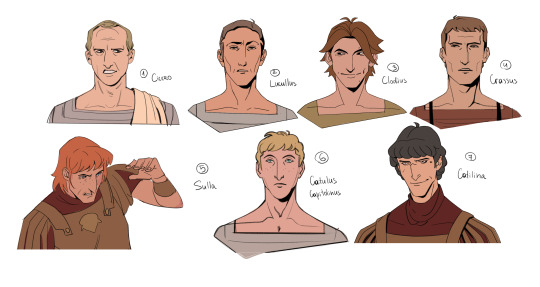
Cicero (Marcus Tullius Cicero) – a renowned orator, statesman, and philosopher of the late Roman Republic, famous for his speeches and his writings on rhetoric and politics.
Lucullus (Lucius Licinius Lucullus) – a Roman sullan general and politician best known for his military victories in the Mithridatic Wars (..and for hosting lavish banquets that became legendary in Rome.)
Clodius (Publius Clodius Pulcher) – a controversial and populist politician who clashed with the Roman elite, notorious for his street gangs and for playing a key role in Cicero’s temporary exile.
Crassus (Marcus Licinius Crassus) – one of the wealthiest men in Rome and a member of the First Triumvirate with Julius Caesar and Pompey, ultimately meeting his end in the disastrous Parthian campaign.
Sulla (Lucius Cornelius Sulla) – a dictator and military leader who seized power through force, instigated the brutal proscriptions against his enemies, and then voluntarily retired from his dictatorship—an almost unique act in Roman history.
Catulus (Quintus Lutatius Catulus) – a conservative Roman politician and consul noted for his opposition to prominent figures like Julius Caesar and for his involvement in the crackdown on Catiline’s conspiracy.
Catiline (Lucius Sergius Catilina) – An ambitious Roman senator best remembered for leading the Catilinarian Conspiracy (63 BC), an attempt to overthrow the government that was famously thwarted by Cicero.
Hope this helps!!!
37 notes
·
View notes
Text
Today's scholarly findings from the Pharsalia Discord with @pomp-quio, @soldatrose, @transbutchblues, and @thoodleoo.
1. Antony is a carrion-eater. Cases:
moved into Pompey's ghost house and "swallowed" his wealth (Cic. Phil. 2.67)
married the haunted Fulvia
Caesar's body
Cicero's head ("It is said that even at his meals Antony placed the head of Cicero before his table, until he became satiated with the horrid sight" - App. B Civ. 4.20).
Cf. the head of Caesetius Rufus brought to Antony's dinner (Val. Max. 9.5.4)
Cassius' metaphorical body (the general's cloak and sword, Plut. Brut. 45)
perhaps Brutus' literal body
relationship with Cleopatra haunted by Caesar's ghost.
When it is not directly about dead men's bodies, Antony "takes dead men’s houses and marries dead men’s wives" - @transbutchblues.
2. In being a carrion-eater Antony emulates Pompey, who married Crassus' daughter-in-law (and also stole a lot of things, although more often from alive men - which is I think a significant difference).
3. Lucan depicts Antonius the Orator's head "set on a banquet table", just like Cicero's head in Appian's book 4. This continues Lucan's theme of "turning against one's patria = turning against one's ancestors": Antony proscribes his grandfather the same way time-travelling Caesar chases his ancestor Aeneas out of Troy, starting off the washing machine cycles of violence.
100 notes
·
View notes
Text
okay i know im like half a year too early to mention anything about this topic and also tumblr is raving mad about this topic and no one is actually gonna read this but. i read shakespeare's julius caesar for the first time yesterday and i need to be a pretentious fucker for a while. look the one thing i'm glad that tumblr agrees with me about is that the assassination of caesar was incredibly homoerotic like i felt like a madman for thinking that but then i discovered thousands of strangers on the internet are backing me up and i felt better.
i'm talking about the play version of events, not the historical version, by the way; though i will talk about the historical version shortly.
shakespeare really knows how to write his tragedies. that play has not left my mind since i finished reading it, which was, by the way, in one sitting about 24 hours ago. my mind has not stopped thinking about that play for an entire day and i am sure it will continue to do so in the near future.
i love the contrast between the ways caesar himself is portrayed. to some, he is a dead man walking. to some, he is the very anchor of society: the north star. to some, he is just a man, who needs to come home and rest sometimes. to himself, he is a mixture of all of those, but he only ever expresses one of those roles, because he is the dictator of rome, in his eyes, he is the rightful king, the one who has led and will continue to lead rome to glory for years to come, and there was no point in heeding the word of anyone else.
my favourite character, is, quite predictably, brutus. "not that i loved caesar less, but that i loved rome more" okay so what if i cried. (i somewhat shamelessly will admit that i have shed tears over this. as i said, the man knows how to write his tragedies.) on one hand, caesar is brutus' friend, the one who had elected him praetor of rome (i know it isn't directly mentioned in the play that caesar made brutus praetor but he is referred to as praetor and since historically caesar was indeed the one to elect brutus praetor, i think it is safe to assume the same within the context of the play), the one who had pardoned him after he sided with caesar's enemy pompey, the one whom he admitted several times that he loved. on the other hand, brutus was raised to bring honour to his family's name via bringing honour to rome; and thought himself morally righteous when he considered that he wasn't above betraying his friend to end a tyrranical rule, even if it meant allying himself with others who wanted to murder caesar for their own selfish gains. and after following through with what he perceived to be his utmost duty to his country, and his people, and his family, and himself, he is haunted by the ghost of his close friend, something which drives him into the point of his own sword.
betrayals have a special place in my heart because they are so entangled deep in conflicting emotions. to betray one is almost always to stand behind another, but inherently betrayals of others are also betrayals to yourself; there must have been a reason the betrayal was a betrayal and not a simple act of violence. because acts of violence can happen by anyone's hand, but betrayals can only happen by those who are most trusted.
cassius, that motherfucker. i feel the same way towards him as i felt toward lord henry wotton in the picture of dorian gray. egging my favourite character on to go against his homoerotic bestie, like fuck that.
i think i am most fascinated by how i do not know what i would have done if i was in brutus' place. would i have done what he has, plotted against and murdered my best friend who trusted me most, who dedicated his last words to me, who admitted defeat solely when it became apparent to him that i was among the conspirators? or would i have lived with the guilt of perpetuating tyrrany and lived with the guilt of, what in my conscience would have been, subjecting future generations of romans to suffer under a dictatorship, just to be able to greet my friend every day and not be haunted by what i have brought on against him?
that caesar truly did not expect brutus to be among the conspirators breaks my heart. that brutus acted out of duty and moral obligation only to fail miserably after having murdered his friend breaks my heart.
in my mind, these two got reincarnated somehow, in a calmer generation, and talked things through, and rode off together into the sunset.
i didn't ever think i would get so emotional over two dudes from a shakespeare play based on historical events that happened over two millenia ago but here we are. they make me want to cry like a baby.
but onto some actual history.
i'll start of with some nitpicking. when caesar is referred to as julius in the play, i physically cringed. as i cringe whenever anyone else assumes his first name to be julius. caesar's full name was gaius julius caesar (or caivs ivlivs caesar, if you will). caesar was the name with which 99% of people would have refered to him, as it was is cognomen, the name that was supposed to distinguish you from everyone else in roman society, and the one formally used to refer to you. if one were close to caesar, one would have called him gaius, which was his praenomen, of which there were only about twelve to choose from. julius, on the other hand, was his nomen, or the name passed down based on which clan he was decended from, in his case the julii. no one actually used the nomen to refer to anyone, as many, many men could be not in the least bit related anymore and yet share the same nomen. it would simply have been too confusing.
now, some common knowledge. "et tu, brute?" was never really uttered by caesar. the two most popular theories as to what caesar said after having been stabbed is that he either said nothing at all, which is what ancient scholars generally agreed upon, although it was expected of him to say something as he was expected to leave behind a legacy. some think he said "you too, child." in greek. initially, this may seem like it is a question that holds essentially the same meaning as "et tu, brute?": one of shocked betrayal, of the question of how even someone as close to caesar as brutus could do this to him. but it is more likely that it was instead a statement, and indeed the shortened version of a common roman proverb, essentially meaning "what goes around comes around". so what caesar would have meant by that is you too will meet your demise in a similar fashion, just you wait. which is very interesting to me
i think the historical relationship of caesar and brutus is very interesting (putting aside my homoerotic intepretation of the shakespeare characters for a moment). brutus' mother was a long-time mistress of caesar, and ancient scholars talked of a rumour that brutus was actually caesar's son, though they were sceptical, and modern historians also generally disagree with this. however, it is true that they were reported to have an affectionate relationship, caesar essentially teaching brutus all he knew like a father would to a son; brutus was raised by his uncle after his father was killed by pompey (also known as pompey the great), so he initially sided with caesar. however, already then, he saw how caesar was becoming overzealous and decided to switch sides and support pompey in the civil war. however, pompey was defeated by caesar in the battle of pharsalus, after which brutus was taken prisoner and eventually pardoned by caesar, granting him the ability to then build his political life in the roman senate. after that, he became one of caesar's closest friends and advisors, even being promoted to be the praetor and then proconsul of rome.
anyway, if you made it this far, have a knife (to stock up for the ides of march). take your pick: 🔪🗡⚔🪒
#ides of march#in october i know#whatever stop judging me#julius caesar#julius caesar shakespeare#how am i supposed to get over this play#how#when it's so deeply embedded now in my soul#wow#brutus
68 notes
·
View notes
Text

Gnaeus Pompeius Magnus (Pompey the Great), this marble bust of the famous general was probably created in the early imperial period and is now a part of the Louvre collection.
#gnaeus pompeius magnus#pompey#ancient rome#roman empire#ancient art#ancient culture#pompey the great#bust#marble bust
60 notes
·
View notes